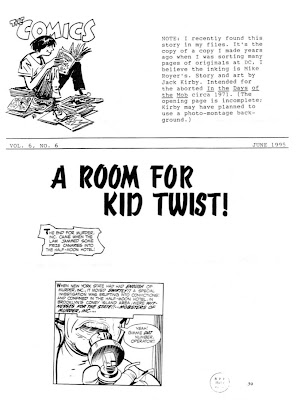Vol. 6, No. 7
July 1995
whole number 67
1995 pages 000-xxx
Volume 5, Number 10
Vol. 5, No. 10
October 1994
whole number 58
October 1994
whole number 58
1994 pages 099-108
This issue opens up with an exchange of letters between Robin Snyder and Robert Kanigher regarding the then-recently published BIG FIVE book about the DC war comics, for which Kanigher wrote a foreword and Snyder wrote an introduction. Apparently there was some editing of the material which Snyder didn't like, so this issue presents them as written.
Kanigher's piece is an epic bit of writing boldly titled "All Men Are Brothers - Starting with Cain and Abel". He gets into all sorts of details and anecdotes on the long history of the DC war line that he was the essential part of from beginning (1952) to end (1988). A wide-ranging memoir that touches on the major characters and artists, the themes and creative process and some of the old grudges.
At the end is a short obituary by Kanigher for then recently passed editor Murray Boltinoff.
Snyder's piece, titled "The Glory Boys" (named for the 1971 Kanigher/Toth short story), is a too-brief profile of the three most important editors of the DC war line: Robert Kanigher, Joe Kubert and Murray Boltinoff.
We also get a larger than normal look at Creig Flessel's logo.
Below, Russ Heath's cover to BIG FIVE (a recreation of a 1962 cover)
Labels:
1994,
Indexed,
Joe Kubert,
Murray Boltinoff,
Robert Kanigher,
Robin Snyder
Volume 5, Number 8
Vol. 5, No. 8
August 1994
whole number 56
1994 pages 073-084
August 1994
whole number 56
1994 pages 073-084
(note, misidentified as "Vol. 4" in the indicia)
Cover this time is a collage of work by Rudi Palais, who answers Snyder's favourite question, what he considers his best work. Inside is a page from a 1953 horror/sci-fi story that looks intriguing.
Alex Toth has a short note and illustration. Batton Lash and Stan Lee also have short notes:
"[Steve Ditko's] a most complex individual." -- Stan Lee
Longer letters from Hames Ware and Jerry DeFuccio on a variety of topics.
William Woolfolk has the second part of his auto-biography, "Perseverance", on his work at MLJ:
"For the uninitiated there was a clear distinction between AGHH and AARGH, scrupulously adhered to by most writers. AGHH was when the villain suffered serious but not decisive or mortal blow. AARGH was when it was time to call the ambulance or the morgue." -- William Woolfolk
Robert Kanigher provides an essay titled "Flare Path", with some thoughts on the "DC" war comics:
"DC had no more to do with the war comics than it had with the building of the pyramids" -- Robert Kanigher
He also goes in depth on one particular story, "The Glory Boys" (Our Army at War #235, 1971), a Toth illustrated masterpiece.
Subscribe to:
Posts (Atom)














